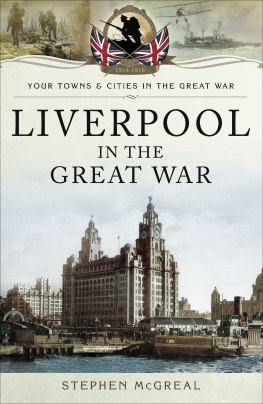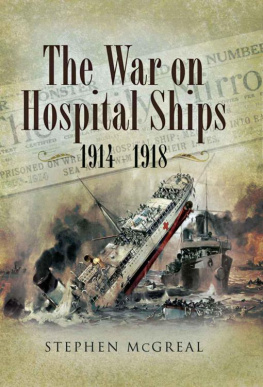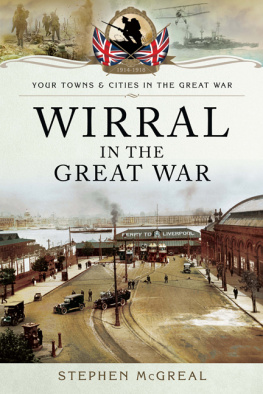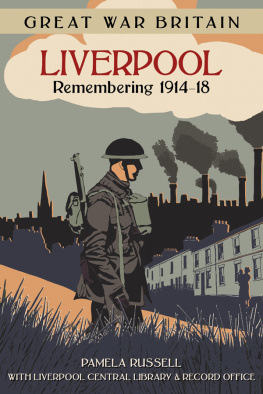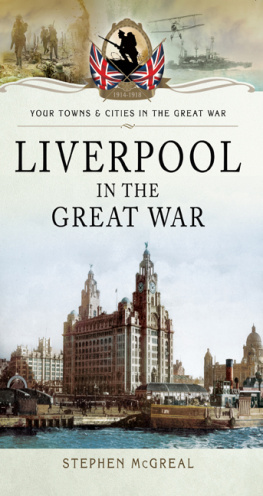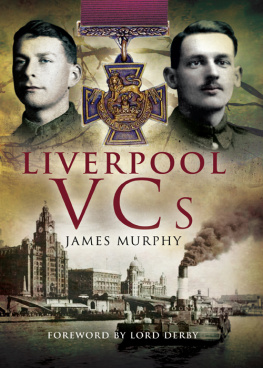Stephen McGreal - Liverpool in the Great War
Here you can read online Stephen McGreal - Liverpool in the Great War full text of the book (entire story) in english for free. Download pdf and epub, get meaning, cover and reviews about this ebook. year: 2014, publisher: Pen & Sword Books, genre: Non-fiction. Description of the work, (preface) as well as reviews are available. Best literature library LitArk.com created for fans of good reading and offers a wide selection of genres:
Romance novel
Science fiction
Adventure
Detective
Science
History
Home and family
Prose
Art
Politics
Computer
Non-fiction
Religion
Business
Children
Humor
Choose a favorite category and find really read worthwhile books. Enjoy immersion in the world of imagination, feel the emotions of the characters or learn something new for yourself, make an fascinating discovery.
- Book:Liverpool in the Great War
- Author:
- Publisher:Pen & Sword Books
- Genre:
- Year:2014
- Rating:5 / 5
- Favourites:Add to favourites
- Your mark:
- 100
- 1
- 2
- 3
- 4
- 5
Liverpool in the Great War: summary, description and annotation
We offer to read an annotation, description, summary or preface (depends on what the author of the book "Liverpool in the Great War" wrote himself). If you haven't found the necessary information about the book — write in the comments, we will try to find it.
Liverpool in the Great War — read online for free the complete book (whole text) full work
Below is the text of the book, divided by pages. System saving the place of the last page read, allows you to conveniently read the book "Liverpool in the Great War" online for free, without having to search again every time where you left off. Put a bookmark, and you can go to the page where you finished reading at any time.
Font size:
Interval:
Bookmark:

Dedicated to the memory of the
Hillsborough 96

First published in Great Britain in 2014 by
PEN & SWORD MILITARY
an imprint of
Pen and Sword Books Ltd
47 Church Street
Barnsley
South Yorkshire S70 2AS
Copyright Stephen McGreal, 2014
ISBN 978 1 47382 161 3
eISBN 9781473841277
The right of Stephen McGreal to be identified as the author of this work has been asserted by him in accordance with the Copyright, Designs and Patents Act 1988.
A CIP record for this book is available from the British Library
All rights reserved. No part of this book may be reproduced or transmitted in any form or by any means, electronic or mechanical including photocopying, recording or by any information storage and retrieval system, without permission from the Publisher in writing.
Printed and bound in England
by CPI Group (UK) Ltd, Croydon, CR0 4YY
Typeset in Times New Roman by Chic Graphics
Pen & Sword Books Ltd incorporates the imprints of
Pen & Sword Archaeology, Atlas, Aviation, Battleground, Discovery, Family History, History, Maritime, Military, Naval, Politics, Railways, Select, Social History, Transport, True Crime, and Claymore Press, Frontline Books, Leo Cooper, Praetorian Press, Remember When, Seaforth Publishing and Wharncliffe.
For a complete list of Pen and Sword titles please contact
Pen and Sword Books Limited
47 Church Street, Barnsley, South Yorkshire, S70 2AS, England
E-mail: enquiries@pen-and-sword.co.uk
Website: www.pen-and-sword.co.uk
Acknowledgements

To faithfully encompass the conditions prevailing upon the home front, the author has extensively consulted contemporary local newspapers. Any information relating to military activities had to be submitted to the Press Bureau prior to publication. And, much to the frustration of the author, Liverpools war-time censors proved exceptionally diligent in their concealment of home-front activities. However, all was not lost for in the post-war years the Liverpool Courier published seventy-six special reports on Liverpools part in the war. They have proved invaluable and allowed the snippets of information from the contemporary newspapers to be woven into this work. Having spent long days in Liverpool Reference Library trawling through micro film versions of contemporary newspapers, I wish to thank all the staff for their assistance. Roger Hull from the Archives Department for several images of munitionettes and the North Haymarket munition works. Mark Davies for the Flag Day poster image, Peter Hart, Alan Wakefield, Vivien Healey and last but not least Ian Boumphrey, whose forebears managed the Cunard Munition Factory. Ian has generously provided treasured family Cunard Factory material for inclusion in this work and also other images for which I am very grateful.
Picture Credits

All other images from the authors collection.
Introduction

In 1914, Britain was ill prepared for a modern mechanised conflagration, having prioritised its defence budget on developing the worlds greatest navy at the expense of its small professional army. In direct contrast Germany had a slightly smaller fleet and the most powerful army in the world. Consequently, in the summer of 1914 as Britain took faltering steps along the path to Armageddon we were incapable of sustaining a protracted Continental war. Lord Kitchener famously appealed for a New Army of volunteers and recruiting officers were inundated with erstwhile recruits.
When Europe plunged into war an unprecedented arms race ensued and the civilian population strove to deliver the equipment and manpower so desperately needed in the front line. The citizens of Merseyside were no exception, for every personal and material force which constituted twentieth-century Liverpool was hurtled into the fight to preserve the British Empire. Geographically the ports location determined it became one of the major home bases of wartime operations. An estimated 150,000 men from Liverpool and district served in the First World War, and some 13,500 were casualties. The fighting qualities of Liverpool battalions are fairly well documented, but scant recognition has been made to those who provided the weapons and munitions. On the home front every normal civilian activity became a means of fund raising, each day was equivalent to Red Nose Day, Children In Need Day and every other worthy cause rolled into one. The First World War was greatly financed by people, who asked for and received nothing whatsoever from the state, but were still inspired by patriotism and allegiance to the king and the belief in their cause. Their trials and tribulations have mainly fallen into obscurity; arguably without the industrial powerhouse of the port and city of Liverpool, the victory we take for granted would not have materialised.
CHAPTER 1
A Summary of Nineteenth-century Liverpool

In 1207, on the eastern side of the Mersey estuary, a cluster of buildings fringing a sheltered creek and connecting tidal pool were granted a Royal Charter by King John. This elevation to market town status attracted tradesman and more inhabitants. Over the centuries mercantile trade gradually increased, and the first recorded American cargo arrived in 1648. But the harbour facilities were woefully inadequate so the increasing prosperous port employed Thomas Steers to design the worlds first enclosed dock fitted with a watertight gate to eliminate tidal water rise and fall. The new dock opened in 1715, and four more docks followed.
In the latter part of the eighteenth century, Liverpool became a slaving port. Most of the towns principal merchants were involved in the Triangular Trade. On the outward voyage Liverpool ships carried inexpensive goods which were exchanged for slaves, gold or ivory. On the middle passage, slaves were transported to America or the West Indies where they were sold. On the final leg of the triangle, Liverpool ships returned laden with cotton, sugar, rum and tobacco. The shameful trade became the backbone of Liverpools prosperity. Some Liverpool slaves became free men, their legacy being Britains oldest black community dating to a least the 1730s. The slave trade was officially abolished in 1807.
By 1801, Liverpool had a population of 77,000, and a decade later due to an abundance of employment the number had soared to 118,000. During the early nineteenth century, 40 per cent of the worlds trade passed through Liverpool docks. To accommodate the burgeoning trade, in rapid succession robust new docks opened Canning 1828, Clarence 1830, Brunswick 1832, Waterloo 1834, Trafalgar 1836, Canning 1842 and Albert Dock in 1846.

A part of the Albert Dock today.
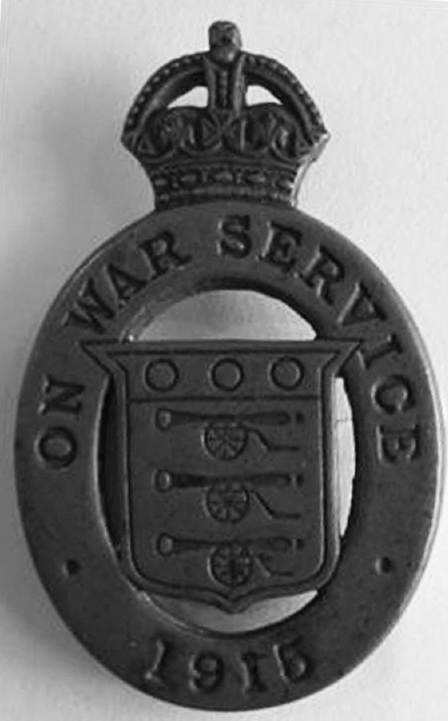
The On War Service munition badge.
The contribution of the proactive members of the Civic Service League was unquestionable. They possessed two donated ambulances and required more for transporting the wounded from station to hospital. An appeal for funds for ten ambulances was so successful that within five days sufficient donations had been received to purchase fifteen vehicles at a cost of 350 each. The glorified vans were all built to the specification of Sir James Barr. On 18 June, to mark the centenary of the Battle of Waterloo, the seventeen vehicles numbered one to eighteen, number thirteen being omitted, were drawn up along the Town Hall railings and ceremoniously presented to the city.
Font size:
Interval:
Bookmark:
Similar books «Liverpool in the Great War»
Look at similar books to Liverpool in the Great War. We have selected literature similar in name and meaning in the hope of providing readers with more options to find new, interesting, not yet read works.
Discussion, reviews of the book Liverpool in the Great War and just readers' own opinions. Leave your comments, write what you think about the work, its meaning or the main characters. Specify what exactly you liked and what you didn't like, and why you think so.

